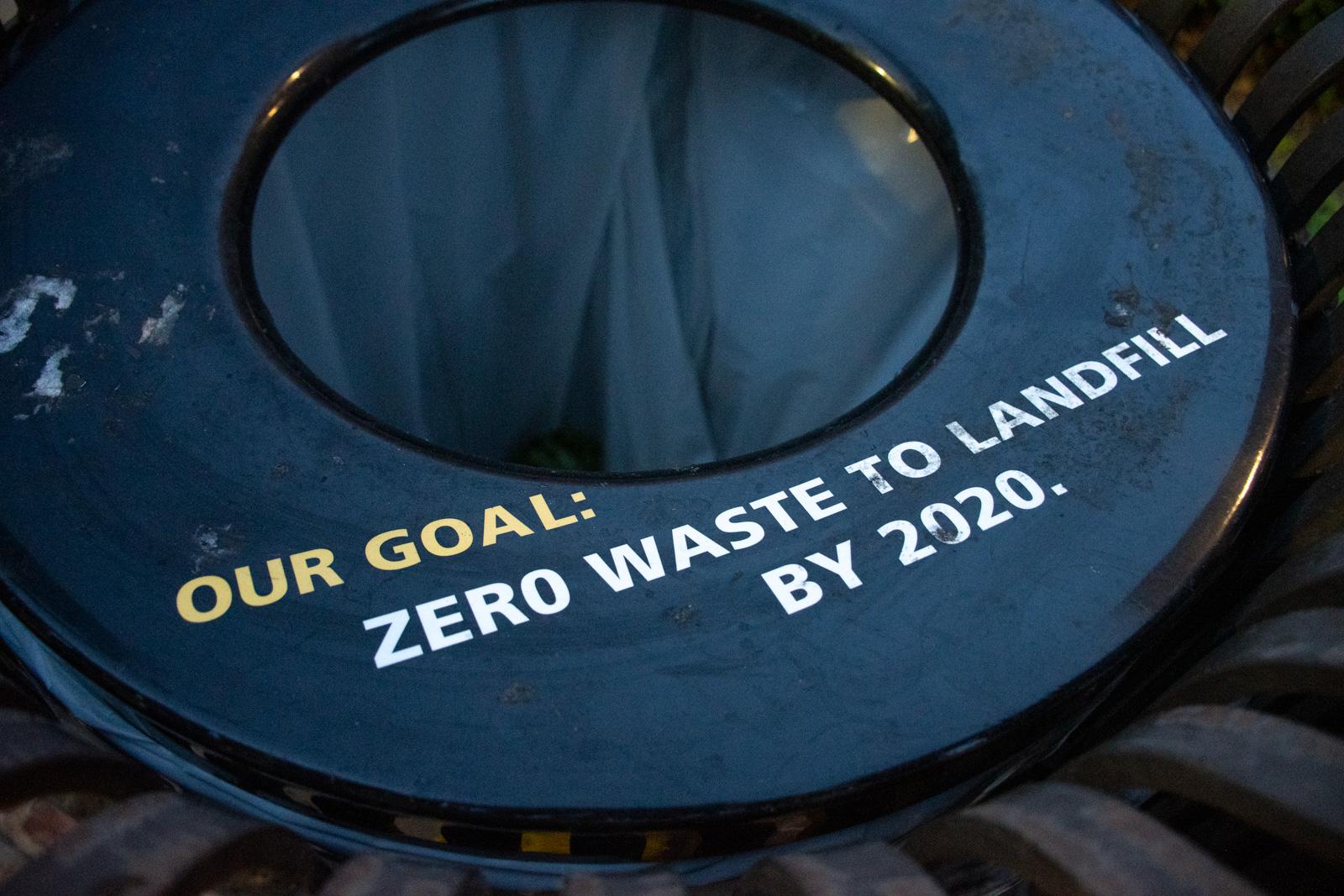Sustainability groups discuss need for more involvement to reach zero waste
The University of California promised its campuses would reach zero waste by 2020. Sustainability student groups and administrative entities are not sure UCLA will meet the goal in time. (Lauren Man/Daily Bruin)
By Inga Hwang
April 23, 2019 12:02 a.m.
Several members of sustainability groups on campus said UCLA may not be on track to meet its goal of reaching zero waste by 2020.
The Zero Waste by 2020 goal falls under the University of California Sustainable Practices Policy, issued in 2004. The policy included an intermediate goal of 75% waste diversion by 2012, which UCLA met.
The policy defines zero waste as 95% diversion of waste from landfills. Methods of waste diversion include composting, recycling and trash incineration.
UCLA has met roughly 65% of this goal, said Kikei Wong, a Zero Waste coordinator for UCLA Sustainability.
Wong said she believes the Zero Waste by 2020 goal is still feasible, but the consequences for the UC system and the environment of failing to meet the goal have not been determined.
Shawn Fujioka, a second-year environmental science student and a Zero Waste co-chair for the student group E3: Ecology, Economy, Equity, said she does not believe UCLA will meet the 2020 goal without reducing the amount of plastic sold in campus vending machines.
She added vending machine food could be stored in compostable packaging instead of plastic and aluminum, or vending machines could sell fruit that doesn’t require packaging.
Fujioka said she believes the deadline for the initiative will be pushed back a few years if UCLA does not meet the goal by 2020.
Emily Davis, a second-year biology student and a Zero Waste co-chair for E3, said she believes the emphasis on waste diversion will not be effective for long-term sustainability.
“If we want to be sustainable, we’ll have to target the creation of waste on campus as well,” Davis said.
However, Wong said the Zero Waste Initiative is important for reducing costs associated with the disposal and transportation of waste.
“Zero waste is more than just recycling or composting; it is looking at reducing, reusing, repairing and donating, and trying to create a circular economy,” Wong said.
She added reducing landfill waste lowers the health risks imposed by air, water and land pollution.
The Hill produces 2,300 tons of waste per academic year, said Erin Fabris, a sustainability manager for UCLA Housing & Hospitality Services.
Data summarizing UCLA’s progress toward increased waste diversion is released annually in the UC-wide sustainability report. Since the report does not include information specific to the Hill, it does not state whether 2,300 tons of waste per academic year is an improvement from previous years.
Programs implemented on the Hill to reduce waste sent to landfills include the installation of compost chutes in Hedrick Hall and the distribution of reusable water bottles at takeout dining halls.
Participation in the reusable water bottle program on the Hill is between 5% and 15%, Fabris said. Joshua Witt, an executive steward for UCLA Dining Services, said he believes the program has been effective in reducing the usage of plastic water bottles and soda fountain cups.
On campus, electronic waste can be donated to the human-I-T program, which refurbishes the materials and redistributes them to nonprofit organizations and communities in need.
UCLA Sustainability also began a pilot program of establishing tri-waste stations on campus during fall quarter. The stations, which include compost, recycling and landfill bins, feature labels designed to help students sort their waste between the three bins.
Davis said she thinks the tri-waste stations would be more effective if they had been implemented sooner.
She added while there are tri-waste stations along Bruin Walk and the edges of campus, the lack of compost bins in Ackerman Union undermines the requirement that restaurants serve food in compostable containers.
Davis added that the labels designed to help students sort their waste are inconsistent between stations and can confuse students.
“Some places on campus, it says Styrofoam is recyclable and some places it says that it’s trash,” Davis said.
Student groups are also participating in the effort to reduce waste.
Sithara Menon, a second-year biology student and the external affairs director for California Public Interest Research Group at UCLA, said CALPIRG is focused on eliminating use of single-use plastics and polystyrene on campus.
“It’s important … (to) get rid of the consumption and production of these wastes that don’t ever break down,” Menon said.
Davis said E3 hosts sustainability workshops each quarter. She added E3 hosted a workshop on Valentine’s Day focused on sustainable alternatives to packaged candy, such as chocolate-covered strawberries.
Fujioka said she thinks student engagement in the Zero Waste movement is low outside of sustainability-focused student groups.
“People in (E3) are definitely participating but then if you talk to other people, not everybody knows,” Fujioka said. “On the Hill there’s compostable containers but nobody knows they’re compostable.”
Davis said she believes all students can participate in waste reduction through educating themselves and others and reducing waste in their own ways.
“The more that you educate yourself, you’re able to educate others and invite them into the conversation to reduce their waste in whatever ways are accessible for them,” Davis said. “Everybody can do something but that something is different for everyone.”
